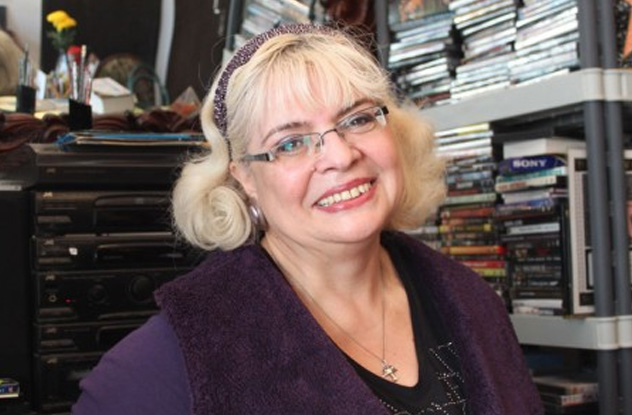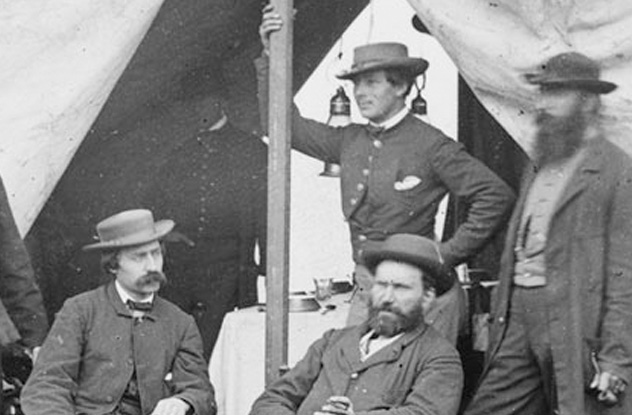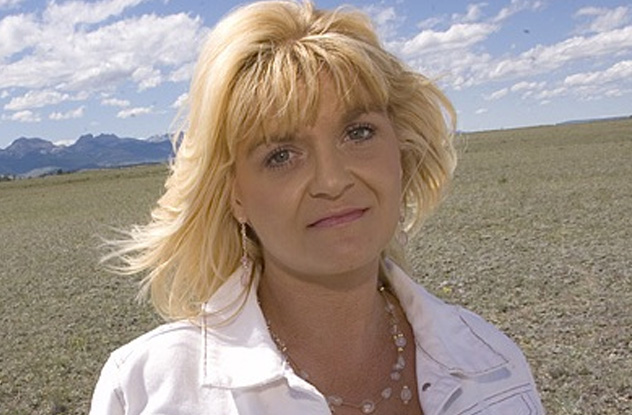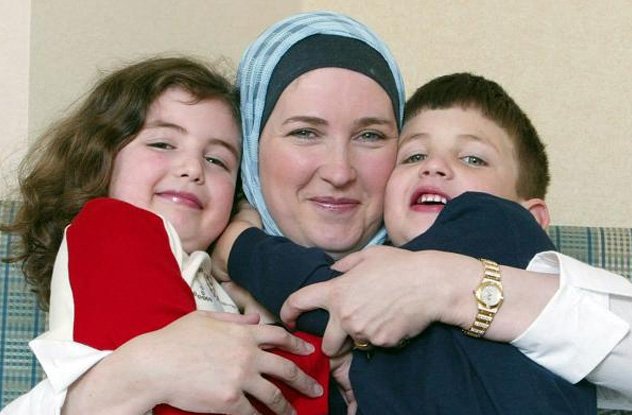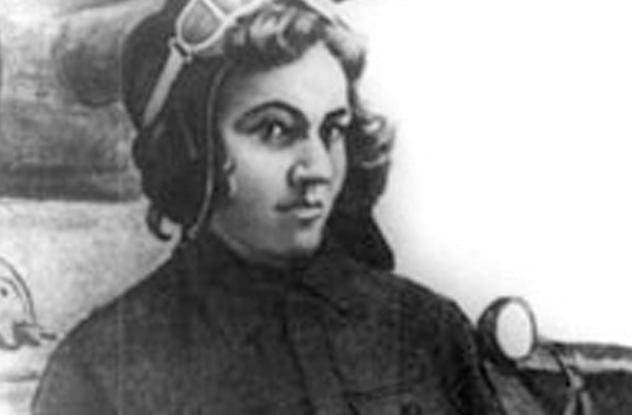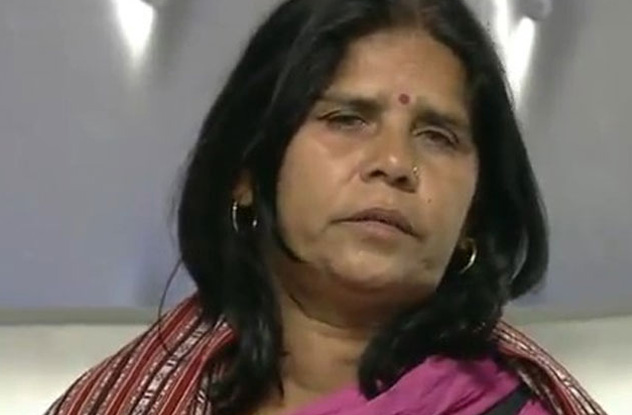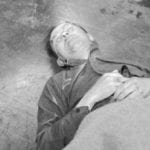10Lydia AngiyouBear Wrestler
Lydia Angiyou stands 155 centimeters (5’1”) and weighs about 40 kilograms (90 lb). She isn’t exactly what you’d call “intimidating,” but appearances are deceiving. This is one Inuit lady you don’t want to mess with. The 43-year-old was walking through the town of Ivujivik, Quebec when she spotted her nephews and seven-year-old son playing in the streets. But instead of laughing and smiling, the kids were terrified, probably because a 300-kilogram (700 lb) polar bear was heading their way. Afraid it was coming after her kid, Angiyou pulled an Ellen Ripley. Without a moment’s hesitation (or a Caterpillar P-5000 Work Loader for that matter), Angiyou rushed down the road and started punching and kicking the bear. Infuriated, the beast stood up on its back legs, and when Angiyou saw how big it was, she started to cry. The creature reared back and slapped the mother across her forehead and shoulder, sending her sprawling. But Angiyou wasn’t down for the count yet. On her back, she kicked her legs in the air, pummeling the bear to keep it at bay. The monster batted her face and sent her rolling. And the cavalry arrived. A local villager, armed with a rifle, fired a warning shot into the air. The bear shifted its attention to the new threat and charged the hunter. Locked and loaded, the hunter took aim and dropped the bear with one shot. Amazingly, Anigyou survived the encounter with only a few cuts and a black eye. And not only did she save her kid—she was later awarded the Medal of Bravery by the governor of Quebec.
9Leela HazzahGuardian Of The Lions
The lion is probably the most iconic animal in the world, but unfortunately, there aren’t many of these kingly cats left. There are fewer than 30,000 lions in the African wild. In fact, some researchers predict lions will go extinct in Kenya by 2030. While habitat loss plays a huge factor in the lion’s demise, so does lion-human conflict. In Kenya alone, 100–1,000 lions die each year at the hands of angry farmers. However, you also have to consider the human side of this equation. Take the Maasai, for example. Livestock is incredibly important to the Maasai. Cows are their currency and play a crucial role in their daily lives. So when hungry lions meet desperate ranchers, things rarely end well. That’s where Leelah Hazzah comes in. After learning lions had gone extinct in her homeland of Egypt, Hazzah dedicated her life to protecting these big cats. After earning a master’s degree, she traveled to Kenya and set up the lion conservation group the Lion Guardians. These Guardians are all Maasai warriors, the very people responsible for so many lion deaths. In addition to defending their herds, Maasai men kill lions as sort of an initiation rite. Hunting these cats is part of their culture. But after Hazzah spent a year living with the Massai—explaining how lions play an important part in the ecosystem and help bring in foreign tourist dollars—65 Maasai warriors put down their weapons and joined Hazzah’s super group. The Guardians teach other Maasai about the importance of lions, build stronger fences to protect cows, and keep track of the lion population. They earn $100 a month and are also taught to read and write. According to CNN, the Guardians have a 99-percent success rate saving lions in the Amboseli region of Kenya. Leela Hazzah can take a lot of pride in that.
8Irina Margareta NistorThe Voice Of All Actors
Romania wasn’t a fun place in the 1980s. Under the iron hand of Nicolae Ceausescu, people lived in fear of the Romanian secret police and their network of informers. There were food shortages and medicine shortages, and government censors were incredibly scissor-happy. Western movies featuring love scenes were chopped to pieces. Scenes depicting priests were forbidden. And any scenes with flashy cars, swimming pools, or lots of food were left on the editing room floor to avoid reminding Romanians of what they didn’t have. If you were sick of the censorship, you could buy a black market VCR. However, if you couldn’t afford your own (some people actually sold their cars or apartments), you could buy a ticket to an underground theater. People who had enough cash to own VCRs turned their homes into outlaw cinemas. Living rooms were crammed with people desperate to see an American horror flick or watch Chuck Norris in action. But despite the different genres, most of these movies had one thing in common. They were all narrated by the same mysterious woman. Her name was Irina Margareta Nistor, and after Ceausescu, she probably had the most recognizable voice in Romania. By day, Nistor worked for the government, translating foreign films for censorship boards. By night, she worked in a secret basement, translating unedited movies for a dealer who sold the tapes on the black market. Due to time constraints, she wasn’t able to watch movies twice and had to translate the films on her first viewing. She’d wait for the actor to say a line, and then she’d repeat the dialogue in Romanian. Down in the basement, Nistor voiced everyone from Jean Claude Van Damme to Woody Allen. She dubbed seven to eight movies a day, and between 1985 and the Romanian Revolution, she translated around 5,000 movies. Even though she didn’t set out to become a superhero (she really just wanted to watch new films), Nistor became the voice of rebellion. She provided people with a window to the West that helped them escape the confines of communism. Today, Nistor works as a film critic, but people still remember how her voice gave them happiness in the darkest of times.
7Kate WarneAmerica’s First Female Detective
Back in 19th-century America, there weren’t a lot of Clarice Starlings or Temperance Brennans running around. Detective work was strictly a man’s game, until Kate Warne showed up. In 1856, this twenty-something widow walked into the Pinkerton Detective Agency, looking for work. Intrigued, head honcho Allan Pinkerton offered her a job, making Warne the first female detective in US history. She also helped save Abraham Lincoln’s life. After Honest Abe’s election, a group of Southern sympathizers plotted to take Lincoln out of the picture. When the President-elect left his home state of Illinois for the White House, he had to travel through Baltimore on his way to D.C. When he showed up in “Charm City,” the assassins would pick him off. Fortunately for Lincoln, Pinkerton caught word of the plot and showed up with three agents, including Warne. As Pinkerton gathered information while disguised as a stockbroker, Warne pretended she was a wealthy Southerner and learned important details about the assassination by mingling at social functions. After convincing Lincoln his life was in danger, Pinkerton escorted the President-elect through Baltimore, and Warne played a pivotal role in the Pinkerton’s plan. First, she reserved four secluded booths in the back of a Philadelphia train, claiming they were for her, a sick brother, and two other relatives. Next, she came up with a disguise for the “sick brother,” offering Lincoln a shawl, a cap, and a traveling bag. She even suggested the 193-centimeter (6’4”) giant stoop a little bit. Once aboard the train, Warne stayed in the booth next to Lincoln, armed with a pistol and ready to fire. To prevent word of Lincoln’s arrival in Baltimore, Pinkerton ordered telegraph wires cut and placed additional agents along the railway to make sure everything was secure. When the train made it to Baltimore, Lincoln stayed inside his booth as the passenger car was connected to a second train. Soon, the locomotive was chugging away, leaving the baffled assassins behind. After foiling the Baltimore Plot, Warne helped bust up a Confederate spy ring, was appointed supervisor of Pinkerton’s newly formed Female Detective Bureau, and caught at least one murderer in the 1850s. After suffering an unknown illness, the first female detective in US history died in 1868, leaving behind an incredible legacy for detectives everywhere.
6Shannen RossmillerCybersleuth
Ryan Anderson was a National Guardsman getting ready to go to Iraq, but he wasn’t interested in fighting Al-Qaeda. Instead, he wanted to switch sides. Interested in joining up with insurgents, he visited a radical message board and befriended Abu Khadija, a terrorist based out of Germany. Hoping to impress his new friend, Anderson offered secret info on the American military. Soon after, he was nabbed by the feds. That’s because his online friend Abu Khadija was no terrorist. Abu was really Shannen Rossmiller, a Montana mother who spends her days working for the Montana attorney general. During her free time, she stalks the Internet, searching the web for terrorists. We can trace her odd hobby back to 9/11. Just hours after the attacks, Rossmiller slipped and fractured her pelvis, and over the next few weeks, she was forced to stay in bed. To kill time, she studied current events, read the Quran, and took a nine-week course in Arabic. Then she started hunting online for budding suicide bombers. To fool her prey, Rossmiller created multiple characters with extensive biographies and their own personal quirks. She even researched their hometowns and hideouts so she could drop names of restaurants and mosques. Rossmiller uses these avatars to interact with potential terrorists, some of whom are actual threats. In addition to Anderson, Rossmiller discovered a guy trying to sell nine US Stinger missiles, a young man planning on becoming a martyr, and a Pennsylvanian planning an attack on American soil. And those are just the stories we know about. Some of Rossmiller’s techniques are high-tech, like sending suspects a keylogger, software that captures whatever the terrorist types on his computer. Others of her tricks are hysterically simple. Many times, Rossmiller has talked her suspects into filling out an “Oath of Allegiance to the Jihad” which asks for facts like a legal name, home country, and family contact information. While her cyber-sleuthing has proven effective, Rossmiller has received threats over the phone, and once, someone shot her car. But, she hasn’t backed down in the face of danger. While most of us are watching TV, Rossmiller still spends her free time online, chatting with guys who want to blow us up.
5Donya Al-NahiRescuer Of Kidnapped Kids
Her name is Bond, Jane Bond. That’s what the British Foreign Office calls her, anyway. Her real name is Donya Al-Nahi, and since 1998, she’s gone on multiple undercover missions in countries like Egypt, Morocco, Jordan, and Turkey. Al-Nahi isn’t a superspy infiltrating terrorist cells. She’s an English mother who’s rescued at least 20 kidnapped kids. Born Donna Topen, Al-Nahi converted to Islam at the age of 16 after spending time in Jordan. She later married an Iraqi named Mahmoud and started a family, but everything changed when Al-Nahi met a woman whose husband had taken their child to Libya. Instead of offering condolences, Al-Nahi came up with a plan to get the kid back. The duo headed to Tripoli, where they snatched the girl on her way to school. Al-Nahi distracted the teacher as her friend pulled the kid into a nearby car. The Brits then drove for 17 hours, going all way through Algeria and making their escape at a Moroccan airport. After word of Al-Nahi’s adventure spread across the UK, other Muslim mothers came looking for help, hoping to reclaim children abducted by fathers fed up with Western culture. Charging only for expenses, Al-Nahi traveled across Africa and the Middle East, grabbing kidnapped kids off beaches, out of taxicabs, and away from playgrounds. While most of her escapades ended in success, not every mission went according to plan. Al-Nahi was arrested in Dubai and faced three years behind bars before the Crown Prince intervened. Once, in Jordan, she arrived at a father’s house to find armed guards ready and waiting. She then led the gunmen on a 90-minute car chase. However, Al-Nahi’s greatest challenge came when her husband, Mahmoud, kidnapped two of their own kids and fled to war-torn Baghdad. He should’ve known better. Al-Nahi teamed up with her sister, flew to Iraq, and tracked him down. And with the help of a few American soldiers, Donya got her kids back and safely returned to Great Britain.
4Mariya OktyabrskayaBane Of The Nazis
Born in the Crimean Peninsula, Mariya Oktyabrskaya married a military officer in 1925, and when she wasn’t moving from army base to army base, she was learning how to shoot, working as a nurse, and serving on councils for military wives. But her life as an army bride ended when the Nazis rolled into Russia. Mariya’s husband died in 1941, but Oktyabrskaya wasn’t content to play the grieving widow. Instead, she wanted payback. Ready to take some Nazi scalps, Oktyabrskaya sold everything she owned, used her money to buy a tank, and donated it to the Red Army . . . with one minor condition. She came with the tank. Soviet officials saw the PR value of a vengeful wife-turned-warrior and quickly agreed. But Mariya wasn’t interested in propaganda. She just wanted to kill as many Nazis as possible. After learning how to drive the tank, she was assigned to the 26th Guards Tank Brigade in September 1943, where she worked as a driver and a mechanic. When she first showed up, the men didn’t take her seriously, but Oktyabrskaya earned their respect pretty quickly. Mariya nicknamed her tank “Fighting Girlfriend,” and during her first battle, she crashed right through the enemy lines, mowing over artillery pieces and machine gun nests. Days later, a shell took out her tracks, but even though it was pitch black outside, Oktyabrskaya scrambled into the battlefield, repaired her tank, and roared back into battle. “I’ve had my baptism by fire,” she wrote in a letter. “I beat the bastards.” Things took a bad turn on January 17, 1944. During a nighttime battle, the Germans blasted her tank. Ignoring orders to stay inside, Oktyabrskaya jumped out with her tools. This time, a chunk of shrapnel slammed into her head, sending Oktyabrskaya into a two-month coma. She died on March 15, 1944, but for her courage, Oktyabrskaya became the first female tank driver to the earn the title of “Hero of the Soviet Union.”
3Rukhsana KausarThe Indian Rambo
In 2009, 18-year-old Rukhsana Kausar was living with her family in the Jammu region of northern India, about 30 kilometers (20 mi) from the neutral zone between India and Pakistan. this isn’t the safest place in the world, and the nearby forests were filled with gun-toting terrorists. One day, seven members of a Pakistani terrorist group crawled out of their hiding spots, marched into town, and made a beeline for Rukhsana’s house. They wanted food and a place to stay, and one of them wanted to marry Rukhsana. But when her father said no, things escalated quickly. As four terrorists stood guard outside, the other three beat Rukhsana’s parents with sticks. Till now, Rukhsana was hiding under a bed, but when these thugs started picking on her family, the teen lost her temper. Suddenly, Rukhsana rushed across the room. Like a martial arts expert, she grabbed the terrorist leader by the hair, hurled him into the wall, and split him open with an axe. With the man bleeding on the floor, Rukhsana grabbed his AK-47 and filled him full of lead. At the same time, her 19-year-old brother Eijaz also joined the fray. After hacking and whacking with his own axe, Eijaz picked up an AK, and the siblings opened fire. Armed with machine guns, Rukhsana and Eijaz held off the remaining terrorists for four hours. “I had never touched a rifle before this,” she later told reporters, “let alone fired one—but I had seen heroes in films on TV, and I tried the same way.” All those movies paid off. By the time the terrorists escaped, the Kausars had killed one and injured two more. Terrorists aren’t big on forgiveness. Ready for revenge, the group has tried to kill Rukhsana at least twice since the original attack. Once, they hurled grenades at her house, but she wasn’t home at the time. Later, authorities discovered an IED near the Kausars’ residence but deactivated the bomb. No matter how hard they try, these terrorists just can’t kill her.
2Sampat Pal DeviThe Pink Vigilante
According to a 2012 poll by TrustLaw, a legal news service owned by Reuters, India is the worst G20 country for women. Marital rape is legal, honor killings are a problem, and over 50 million female fetuses have been aborted solely because of their sex. This makes Sampat Pal very angry. Pal lives in Uttar Pradesh, a region in northern India notorious for its sexual violence and corrupt cops. Like many other women in Uttar Pradesh, Pal was married at age 12 and a mother at 15. Illiterate and poor, Pal was regularly mistreated by her in-laws. Frustrated with life, she packed her bags, moved out, and formed several organizations to defend women’s rights. Things took a crazy turn in 2006 when Pal spotted a neighbor beating his wife. When Pal intervened, the brute began to beat her as well. But the next day, Pal and a few friends armed themselves with sticks, tracked the thug down, and taught him a lesson. Word of her actions spread, and soon other women came to Pal, begging for help. Inspired, Pal founded the Gulabi Gang, a band of vigilante women who wear pink saris and carry bamboo batons. (“Gulabi” means “pink” in Hindi.) And if they heard of a husband beating his wife, the Gang showed up at his doorstep, ready to show him the error of his ways. Today, the group numbers over 20,000, and they get results. Especially Pal. When one cop refused to register a rape case, she thrashed the guy until he agreed to do his job. When one power company refused to supply electricity to a nearby town, the gang stormed the company building, and Pal locked the officials in a room until they apologized. With Pal at the head, the Gang has prevented child marriages, protested against the dowry system, saved women from abusive in-laws, and shamed government officials into taking action. When one local politician participated in the gang rape of a 17-year-old, the Gang picketed outside his home until police finally arrested him. In recent years, Pal’s group has expanded into politics, and several members have won important local offices. And much like Teddy Roosevelt, they believe in carrying big sticks.
1Neerja BhanotThe Self-Sacrificing Stewardess
September 5, 1986 seemed like any other day at the Jinnah International Airport in Karachi, Pakistan. Pan Am Flight 73 out of Mumbai was getting ready to fly to Frankfurt, and everything seemed normal until four men dressed as security guards stormed the plane. They were members of the Abu Nidal Organization, a Palestinian terrorist group, and they wanted to take a detour. Their plan was to fly to Cypress, where they’d hold the 300-plus passengers hostage until their comrades were released from prison. But their scheme didn’t pan out. A 22-year-old flight attendant named Neerja Bhanot spotted the terrorists coming and warned the pilots, giving the flight crew time to escape. Without pilots, the terrorists were stuck. As the cabin crew leader, Bhanot was now in charge of the entire plane. Over the next 17 hours, she tried to keep things calm, serving coffee and sandwiches, ever the professional. The terrorists made her job pretty difficult. Not only did they threaten her life, they even murdered a young man as a show of force. Eventually, the terrorists ordered Bhanot to round up all the passports so they could identify the Americans onboard. But she wasn’t playing their game. Instead of handing over the documents, Bhanot scattered them across the plane, hiding them in places the terrorists wouldn’t look. When a group of Pakistani commandoes stormed the plane, the terrorists decided to take out as many hostages as possible. They opened fire on the passengers, and Bhanot went into full-superhero mode. She opened the emergency door and shoved people down the slide. As the bullets went flying, Bhanot shielded three kids with her body, and that’s how she met her tragic fate. Twenty-one people died that day, but if it weren’t for Neerja Bhanot, the casualties would’ve been much higher. For her actions, she was posthumously given the US Special Courage Award, and she became the youngest person to receive the Ashok Chakra, India’s highest award for bravery. In fact, today there’s an award bearing her name, an honor given to women who’ve taken a stand against social injustice.


